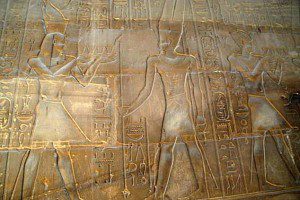chinese-boy-defacing-ancient-egyptian-temple-2
A middle school boy from Nanjing in east China’s Jiangsu Province sparked outrage when he defaced an ancient Egyptian temple.
A picture posted online showed the words “Ding Jinhao was here” in Chinese characters on a relief in the Luxor Temple. The words “was here” were in larger characters.
The post prompted an online search which revealed Ding’s identity, his date of birth and his primary school.
The 14-year-old’s parents have apologized and asked for forgiveness, the Nanjing-based Modern Express newspaper reported yesterday.
“We apologize to Egyptian authorities and Chinese people who pay attention to the incident. He has realized he made a mistake, and we beg your pardon, please give him a chance to correct his act,” they said.
The mother was in tears when she said they realized they had failed to educate their son and felt guilty, the newspaper reported.
The tourist who posted the picture, surnamed Shen, said: “It was the saddest moment during my stay in Egypt, and I felt ashamed.
“We try to wipe out the shame with tissue, but it was difficult to clear it out, and we could not use water as the relief is a historical relic 3,500 years old.”
Shen saw the graffiti during a tour of Egypt on May 6 and took the snapshot. “All of the 14 members of our tour group kept silent after seeing the sentence as we felt ashamed,” he said.
Shen said he apologized to their Egyptian tourist guide, who was shocked when seeing the writing on the relief but told Shen it was not his fault.
Shen said he hoped the incident would remind Chinese tourists to mind their behavior when touring overseas as their actions reflected on China’s image.
The website of Ding’s primary school, the Nanjing Youfu Xijie Primary School, was hacked yesterday. It showed “Ding Jinhao was here” when accessed.
Many online comments condemned Ding for damaging cultural relics and his parents for not educating him properly. One said: “Ding’s uncivilized behavior disgraced Chinese people.” There were even death threats.
Others, however called for tolerance.
“Ding is just a child, and he learns things from adults, and please don’t target a kid, he still has chance to correct wrong behavior,” was one comment.
A new law on tourism adopted in China in April to better protect the rights of tourists and clear the way for the industry’s sustainable development warns against uncivilized behavior but does not specify punishments.
Following the Ding incident, online posts claimed that Song Yin, said to be a senior reporter with the Hong Kong-based Wen Wei Po newspaper, had engraved similar words in a Dunhuang fresco in northwest Gansu Province.
A photograph showing the words: “Senior reporter of Wen Wei Po Song Yin was here for research in lixia in 2000.” Lixia is a Chinese solar term referring to the beginning of summer.
Wen Wei Po condemned the act, but said there was no such person working at the newspaper.
Early this month, a Chinese tourist who posted a picture of coral she had picked up while diving in the Maldives was criticized by experts who said such actions endangered the marine ecological system.
In February, an online post by a museum worker accused a tourist of engraving words on a large water vat in the Forbidden City in Beijing. “Liang Qiqi was here,” read the characters scratched on the side of the bronze vessel.

